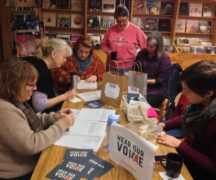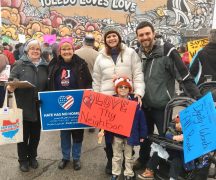By JAN LARSON McLAUGHLIN
BG Independent News
Afflicted with PMS – post march syndrome – these women are a force to be reckoned with.
Two weeks ago, the Bowling Green women were marching for their rights, in Washington, D.C., Los Angeles, Chicago and Ann Arbor. Now they are contemplating how to best use the momentum from that march to create positive change locally and nationally.
They are emailing and calling their legislators. They are getting involved in local causes. They are not passively watching as the administration of President Donald Trump whacks away at civil rights.
“Somewhere along the line, we dropped the ball. We got complacent,” said Ginny Stewart, who marched in Los Angeles with three generations of her family including her 87-year-old mother. “We have to stay vigilant or they win.”
Now that they are back home, the women cringe at the almost hourly news of Trump’s actions. As they sat around a table discussing the political climate, Debbie Dalke checked her phone for the latest news. She shook her head as she read about Trump’s “religious freedom order” which would legalize discrimination.
“The things Trump is doing are disastrous. But I think some will backfire,” said Dalke, who marched in Washington, D.C. She carried a sign addressed to Trump, saying “A great America is not racist, sexist or homophobic.” Dalke referred to Trump’s “travel ban,” which resulted in $24 million in donations to the American Civil Liberties Union. “They are dedicated to holding him to the Constitution.”
The daily onslaught of executive orders is nearly overwhelming.
“It’s exhausting and depressing,” said Carol Kinsey, who marched in Chicago with her daughter, her former husband and his husband. She carried a yellow poster shaped like a yield sign with silhouettes of three women. It read, “Dangerous curves ahead.”
“Being back, there was a lot of emphasis on ‘now what?’’’ Kinsey said. She is focusing her attention on local issues where she feels she will have the greatest impact.
“I feel I have a vehicle for being active in ways that matter here,” said Kinsey, who is involved in the Not In Our Town organization. “I’m really narrowing down.”
Kinsey said she is working hard to not be overwhelmed by all the negative news. “I’m not going to let this eat me up totally.”
Stewart, a Bowling Green school board member, is also zeroing in her focus – choosing schools and civil rights as her top concerns. So she is fighting against the nominations of Betsy DeVos as education secretary and Jeff Sessions, who she called “dangerous,” as attorney general.
“I will not allow myself to not have hope,” Stewart said. “I can make a difference here.”
She admitted it’s crushing at times. “It’s so awful, I can hardly stand it,” Stewart said. “But this is not going to get fixed in a week.”
Kay Chapman, who marched in Ann Arbor carrying a sign saying “Silence = Complicity,” has faced the same tough reality back in Bowling Green.
“I was feeling great when I got back and then I checked in with my more right wing friends at the end of the first week (of Trump’s presidency). They are jubilant,” Chapman said.
But Chapman, like the others, is committed to continue marching. The March for Science is planned for April, then the March for LGBT rights in June.
Marcia Rybczynski, who marched in Ann Arbor carrying a sign with sunglasses saying, “We’re watching our rights,” said she was heartened by seeing so many other Bowling Green women marching.
“Sometimes in Bowling Green you can feel a little isolated,” she said. “But there are a lot of us who are deeply disheartened by what is happening already now.”
Another woman, who asked that her name not be used since she works in a conservative industry where she feared her business would suffer if she spoke openly, took her 12-year-old daughter with her to the march in Washington, D.C.
Their bus broke down so it took 11 hours to get outside D.C., where they hopped on the metro. “Every stop, there were more and more people” getting on for the march, she said. Once at the march, the crowd was massive. “Every street you turned down, there was a crowd. I’ve never seen that many people.”
Outside Trump Hotel, they joined in the chant, “We pay our taxes, why don’t you?”
Her participation in the march has damaged her already poor relationship with her conservative mother – but she has no regrets. “Seeing all the marches, it makes me feel it’s part of a movement, not just a one-day event.”
Dalke also endured a bus ride to Washington, D.C., and spoke of rest areas and subways “packed with women as far as you could see. There was a feeling of camaraderie.”
Kinsey had one disappointment during the Chicago march where women were encouraged to get involved – but no mention was made about the need to vote. “That’s part of the problem with this election – that people who could have voted, didn’t,” she said. “It was such a simple thing.”
The defining moment for Stewart in Los Angeles was when the crowd, with fists raised, began shouting “Si Se Puede” meaning “Yes we can.”
“It gives me goose bumps,” said Stewart who grew up in California. “I realized how full life is when you are surrounded by diversity. It wasn’t just Latinos, it was everyone. It wasn’t in anger, it was in solidarity.”
All the women spoke of how the marches in every city were peaceful protests – with no violence or arrests.
“I want us to remember that. You can do this with peacefulness,” Stewart said.




